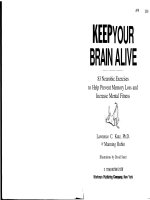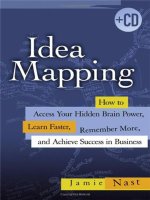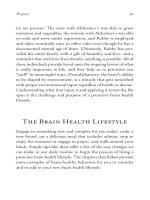Mind games 31 days to rediscover your brain martin cohen
Bạn đang xem bản rút gọn của tài liệu. Xem và tải ngay bản đầy đủ của tài liệu tại đây (2.95 MB, 170 trang )
About the Author
Martin Cohen is editor of The Philosopher, and one of today’s best-known
authors introducing key issues in philosophy, social science and politics
to a wider audience. His books (more than 250,000 copies sold) have
helped revolutionise the way mainstream philosophy is discussed and
written about, spawning a new generation of popular introductions to the
subject. Refusing to accept traditional constraints on subject matter and
style, he has been aptly dubbed by his Taiwanese publisher as the ‘enfant
terrible’ of philosophy.
Other recent books include Wittgenstein’s Beetle and Other Classic Thought
Experiments (Blackwell, 2004), No Holiday: 80 Places You Don’t Want to
Visit (Disinformation Travel Guides) (2006), Philosophical Tales (Blackwell,
2008), and the UK edition of Philosophy for Dummies (Wiley, 2010).
Martin Cohen
A John Wiley & Sons, Ltd., Publication
This edition first published 2010
© 2010 John Wiley & Sons Inc
Blackwell Publishing was acquired by John Wiley & Sons in February 2007. Blackwell’s publishing
program has been merged with Wiley’s global Scientific, Technical, and Medical business to form
Wiley-Blackwell.
Registered Office
John Wiley & Sons Ltd, The Atrium, Southern Gate, Chichester, West Sussex,
PO19 8SQ, United Kingdom
Editorial Offices
350 Main Street, Malden, MA 02148-5020, USA
9600 Garsington Road, Oxford, OX4 2DQ, UK
The Atrium, Southern Gate, Chichester, West Sussex, PO19 8SQ, UK
For details of our global editorial offices, for customer services, and for information about how to
apply for permission to reuse the copyright material in this book please see our website at www.wiley.
com/wiley-blackwell.
The right of Martin Cohen to be identified as the author of this work has been asserted in accordance
with the UK Copyright, Designs and Patents Act 1988.
All rights reserved. No part of this publication may be reproduced, stored in a retrieval system, or
transmitted, in any form or by any means, electronic, mechanical, photocopying, recording or
otherwise, except as permitted by the UK Copyright, Designs and Patents Act 1988, without the prior
permission of the publisher.
Wiley also publishes its books in a variety of electronic formats. Some content that appears in print
may not be available in electronic books.
Designations used by companies to distinguish their products are often claimed as trademarks. All
brand names and product names used in this book are trade names, service marks, trademarks or
registered trademarks of their respective owners. The publisher is not associated with any product or
vendor mentioned in this book. This publication is designed to provide accurate and authoritative
information in regard to the subject matter covered. It is sold on the understanding that the publisher
is not engaged in rendering professional services. If professional advice or other expert assistance is
required, the services of a competent professional should be sought.
The views expressed in this book are the views of the author and do not reflect the views of the
publisher. The information contained in this book is presented solely for entertainment purposes. In
no event shall the publisher assume liability for any direct, indirect, incidental, consequential, special,
or exemplary damages arising from the use or misuse of the information contained in this book,
whether based on warranty, contract, tort, or any other legal theory, and whether or not the company
is advised of the possibility of such damages.
Library of Congress Cataloging-in-Publication Data
Cohen, Martin, 1964–
Mind games : 31 days to rediscover your brain / Martin Cohen.
p. cm.
Includes bibliographical references and index.
ISBN 978-1-4443-3709-9 (pbk. : alk. paper) 1. Consciousness.
experiments. I. Title.
B105.C477C62 2010
128′.2–dc22
2010016200
A catalogue record for this book is available from the British Library.
Set in 10/12.5 pt Galliard by Toppan Best-set Premedia Limited
Printed in Singapore
01
2010
2. Thought
Contents
Forward!
Acknowledgements
How To Use This Book
x
xi
xii
Week 1 Influencing the Reptile Mind
1
Day 1 Words
Task: Spend all day trying to think for yourself
3
Day 2 Identifying the Reptile
Task: Identify, and talk to, the reptile in your head
4
Day 3 The Fallacy of the Lonely Fact
Task: Try testing someone’s sense of randomness. Offer them a little bet
7
Day 4 The Immortals
Task: Write (or at least start) a book
8
Day 5 My Three Favourite Animals
Task: Complete an innocuous-looking survey about animals.
9
Day 6 The Prison of the Self
Task: Attempt to escape ...
10
Day 7 Trappism
Task: Don’t talk to anyone
11
vi
Contents
Week 2 Observing the Development of Little Minds
13
Day 8 Dotty Experiments on Teddies
Task: Get Piaget and Teddy to try to unconserve the numbers
15
Day 9 (a.m.) The Cow in the Field-that-gets-built-on
Task: Make a board game for children
17
(p.m.) The Mountains of Egocentricity
Task: Construct a device to measure egocentricity
19
(evening) Behave Yourself !
20
Task: Apply behaviourist principles to those around you
Day 10 The Dissonance of the $1 Volunteers
Task: Make the children (or employees, or partners) do some boring
22
repetitive activities
Day 11 Investigating Memory
Task: Memory test: how many of the words can you remember?
24
Day 12 Jargon for Dummies
Task: Manage someone
26
Day 13 Be Lucky!
Task: Find out how unlucky you are
27
Day 14 This Is Not a Self-help Book
Task: Boil down a self-help book
28
Week 3 Experiments in Practical Philosophy
29
Day 15 The Upside-down Goggles
Task: Make – and wear – some special goggles
31
Day 16 Fire-walking and Cold Baths
Task: Prepare a bed of red-hot coals or wood embers
33
Day 17 R-pentomino
Task: Make some of your very own microbes
35
Day 18 (a.m.) Proprioception (Scratching Noses Test)
Task: Fool your senses into believing your nose is several feet long
37
(p.m.) Hear the McGurk Effect
Task: Fool your senses into hearing things that aren’t there ...
38
Contents
Day 19 (a.m.) Go for a Long Walk on the Much Too Long
Coastal Path
Task: Measure it in centimetres
vii
39
(p.m.) Make a Bed of Nails
Task: Lie on it overnight
41
Day 20 Now Getting Really Rather Dangerous ...
Task: Look at something boring on the Internet
43
Day 21 Doodle
Task: Draw something
45
Week 4 Miscellaneous Philosophical Investigations
47
Day 22 (a.m.) Molyneux’s Problem
Task: No more dangerous tasks. Pause to conceptualise
49
(p.m.) Mary’s Room
Task: Why is this one here?
50
Day 23 Unable To See Change
Task: Check who you are living or working with is the same person as yesterday
51
Day 24 Cascade Theory
Task: Chair (or rather rig) a discussion
52
Day 25 Explain Yourself !
Task: Try to predict your day
54
Day 26 Investigating Un-Reason and Argument
Task: Play on ambiguity
55
Day 27 Subliminal Messages
Task: Become aware of hidden messages all around you
56
Day 28 (a.m.) The Power of Prayer
Task: Pray a little
58
(p.m.) Pray for Good Crops
Task: Pray a little bit harder
59
Day 29 The Horror and the Beauty Or Vice Versa
Task: Have a vision – or at least a dream
60
Day 30 Strange Things
Task: Conduct some telepathy
63
viii
Contents
Day 31 Manipulating Minds down on the Farm
Task: Read between the lines ...
66
Debriefing
69
Week 1: Influencing the Reptile Mind
71
Day
Day
Day
Day
Day
Day
Day
71
71
75
77
78
79
82
1
2
3
4
5
6
7
Words
Identifying the Reptile
The Fallacy of the Lonely Fact
The Immortals
My Three Favourite Animals
The Prison of the Self
Trappism
Week 2: Observing the Development of Little Minds
83
Day 8 Dotty Experiments on Teddies
Day 9 (a.m.) The Cow in the Field-that-gets-built-on
(p.m.) The Mountains of Egocentricity
(evening) Behave Yourself!
Day 10 The Dissonance of the $1 Volunteers
Day 11 Investigating Memory
Day 12 Jargon for Dummies
Day 13 Be Lucky!
Day 14 This Is Not a Self-help Book
83
85
86
87
88
89
93
95
97
Week 3: Experiments in Practical Philosophy
98
Day
Day
Day
Day
Day
15
16
17
18
19
The Upside-down Goggles
Fire-walking and Cold Baths
R-pentomino
Proprioception and the McGurk Effect
(a.m) Go for a Long Walk on the Much
Too Long Coastal Path
(p.m.) Make a Bed of Nails
Day 20 Now Getting Really Rather Dangerous …
Day 21 Doodle
98
99
100
103
105
106
106
107
Contents
ix
Week 4: Miscellaneous Philosophical Investigations
110
Day 22 (a.m.) Molyneux’s Problem
(p.m.) Mary’s Room
Day 23 Unable To See Change
Day 24 Cascade Theory
Day 25 Explain Yourself !
Day 26 Investigating Un-Reason and Argument
Day 27 Subliminal Messages
Day 28 (a.m.) The Power of Prayer
(p.m.) Pray for Good Crops
Day 29 The Horror and the Beauty. Or Vice Versa
Day 30 Strange Things
Day 31 Manipulating Minds down on the Farm
110
111
113
114
119
120
126
127
128
130
132
139
Appendix A: Three Lines Test
143
Sources and Suggestions for Further Reading
144
Index
150
Forward!
This is a book about thinking. We’re going to follow Descartes and do a
bit of thinking about thinking. Do monkeys think? Do plants? Not like
us anyway. They just appear to do so, even as they follow preprogrammed
evolutionary strategies. A bit like computers in fact. But, unlike computers, they are ‘undoubtedly’ conscious of something. For if nowadays
everyone agrees that the body, indeed the whole universe, is a machine,
still no one is quite able to say that there isn’t a ghost riding along in the
centre of it.
Descartes wrote ‘I think, therefore I am’, or at least, many people think
he wrote that. He said awareness of the brute fact of existing was the only
he thing he could be sure of, and used this nugget not only to get himself
up in the morning but to rediscover the world. You see, Descartes was
onto something. And that thing is consciousness. Perhaps this is the
central mystery of philosophy. Science can explain everything else, but the
strange sense of self-awareness it can only dismiss as an illusion.
So this book is really a celebration of consciousness, that goes under a
rather more appealing title of Mind Games. There are plenty of these here,
yes, but not merely in the evergreen Sudoku sense of puzzles and conceptual trickery, or in the scientific sense of explorations of the way the
brain works, and often does not work, or even of ‘thought experiments’
in the widest philosophical sense of imaginary scenarios proceeding
through the appliance of logic to factual hypotheses.
These are all very well, but the mind is more than that. It can also deal
with things that do not exist, that do not make sense, that cannot be
explained. Some people even think it can project thoughts instantaneously
across distances, cause departed souls to rematerialise, and, of course, pass
messages directly to the Creator. Yet if serious philosophers have been
loath to countenance such irrationality, that’s no reason to pass up an
opportunity for practising some alternative mind games here. For science,
Forward!
xi
like philosophy should be open to all questions and answers, not just those
that fit the narrow fashions of the times.
And if you try all of the 31 experiments here, and if you still, by the
end of it, can’t remember what month it is let alone anything more
impressively mathematical, still can’t move objects by simply concentrating upon them, nor yet even see through verbal flim-flam to the essential
argumentative core – if you read this book and yet somehow still cannot
do any of that, I can offer you at least one thing. And that is that by the
end of the course it will have turned out that the way you think, and the
way I think, are not quite as individual as ‘I think, therefore I am’ implies.
Because the human mind is created and renewed at every moment collectively, and no one of us can rediscover our sense of self, let alone
rediscover our brain, entirely alone.
Acknowledgements
The illustrations have been specially drawn for this book by the French
artist, Judit, with characteristic attention to the ‘philosophical spirit’ of
the text. I should like especially to thank both her and Wiley-Blackwell’s
indefatigable and scholarly editor, Jeff Dean, for their support, enthusiasm, insights and ideas!
How To Use This Book
This book invites the reader to be active and to participate in the exploration of the ideas and in the experiments themselves. There are ‘answers’
at the back, avoiding the need to carry out all the activities, but these are
not ‘real answers’ they are merely ideas and reflections on the issue, reflections that will be of more value – or quite possibly of no value – after you
have tried the ‘Mind Game’ for yourself.
Now I know plenty of people (especially professors) who find it annoying to have to pause to think, let alone to actually try things out for
themselves. Why not just say what we know about the state of current
knowledge and give some suitable references to peer-reviewed papers?
Surely that would be more logical? But the reason for this active approach
is that the ‘inconveniency’ (as a famous philosopher termed such things)
is also the opportunity to rediscover your brain – something too few
books, let alone professors allow. And then too, in using these kinds of
activities as starting points for philosophical discussions, I’ve been amazed
at just how often people never even turn to the established authorities on
the matters, but prefer to find solutions for themselves.
Many books go only part read. But even if you read only little bits of
this book, that’s fine. Because philosophy is not a body of knowledge,
but an activity, and Mind Games is an opportunity – and an invitation – to
enjoy that.
Words
Task
Spend all day trying to think for yourself
But already, we’re off to a bad start! These words you are now reading,
whose are they?
Whose is that voice in your head? Yours or mine?
When you hear someone speak, the words remain theirs – to be ignored
or disagreed with as you choose. But somehow to read someone’s thoughts
is to allow them, however temporarily, to take over the language centres
of your brain. For as long as you are caught up in what they say, the writer
becomes your inner voice.
Does that mean that, for a moment, the writer becomes the reader?
Or does it mean instead that, for a moment, the reader becomes the
writer?*
* All the tasks are discussed, explained and – just occasionally! – ‘solved’ in the Debriefing
section which makes up the second half of the book. In this case, see p. 71 for a fairly brief
contextual note.
Mind Games: 31 Days To REDISCOVER Your Brain, Martin Cohen © 2010 John Wiley
& Sons Inc
Identifying the Reptile
Task
Identify, and talk to, the reptile in
your head
According to one French psychologist, G. Clotaire Rapaille, most of our
decisions are not determined rationally at all, perhaps using philosophy
or even economics, but are taken surreptitiously in the twilight zone of
the brain. These are decisions taken by what he calls ‘the reptile mind’,
operating in the background, without us even being aware of it.
Dr Rapaille slithered to this understanding while working as a child
psychologist, dedicated to helping children who had trouble communicating and expressing themselves. He found that most of their problems
could be better understood if it was assumed that our human minds
develop in three stages.
The theory
The earliest stage, the ‘reptile’ one, is simply concerned with survival. This
is the stage in which we have to learn to breathe, to move around a bit,
to eat. After a while, all this becomes unconscious.
The stage after this, which Dr Rapaille calls the limbic stage, is when
children develop emotions and conscious preferences. It is when bonding
takes place, for example between the child and its mother, and they
Mind Games: 31 Days To REDISCOVER Your Brain, Martin Cohen © 2010 John Wiley
& Sons Inc
Identifying the Reptile
5
develop affection for certain things – for home, for warmth and for apple
pudding, say.
The third and final stage, the one so beloved of philosophers, seems
to occur after the age of seven, and sees the development of the outer
brain, or the cortex – the part that gets studied and measured extensively
by neurologists and other important-sounding scientists. This is the part
– the only part – that deals with words, with numbers, with concepts. But
we learn many words before this stage.
Dr Rapaille observed, in some children, that certain words produced
certain problems, and these problems were, he realised, not attributable
to the rational mind normally in charge of handling words, but went back
much further, to when the word was first learnt. The children’s difficulties
were evidence, he decided, that each and every word we learn has a special
significance. The word ‘mummy’, for instance, often claimed as the first
one that baby ‘learns’, applies to just one person, who has a certain appearance and does certain motherly things. It is not just Mummy’s voice, or
Mummy’s face, or even Mummy’s smell that baby remembers. The word
itself is ‘imprinted’ in baby’s mind along with all the associations the word
may have acquired: warmth, safety, love.
And the same is true for other less obvious words, such as coffee, car,
or even cigarettes. ‘When you learn a word, whatever it is, coffee, love,
or mother, there is always a first time’, Rapaille once explained, in a
newspaper interview, adding: ‘There’s a first time to learn everything.
The first time you understand, you imprint the meaning of this word;
you create a mental connection that you’re going to keep using the rest
of your life.’
Rapaille calls this a code, an unconscious code in the brain. Each word
was introduced to us at some point, and when it was ‘imprinted’ on our
minds, it was with various associations. Finding these associations reveals
each word’s internalised, secret meaning.
The practice
So now, let’s test the theory: what are the codes, say, for coffee, for cars
or even for cigarettes?
Jot down your associations before you turn the page to see how they
compare to the reptilian Doctor’s …
(Remember that these are not adjectives describing the thing but other
things you link with it)
6
Influencing the Reptile Mind
Coffee reminds me of:
1.
..............................................
2.
............. .................................
3.
..............................................
The car reminds me of:
1.
..............................................
2.
..............................................
3.
..............................................
Cigarettes remind me of:
1.
..............................................
2.
..............................................
3.
..............................................
When you’ve done that, pause a moment to admire your responses, and
then turn to the debriefing section to see the answers.
The Fallacy of the Lonely Fact
Task
Try testing someone’s sense of
randomness. Offer them a little bet
You will toss a coin, say 20 times, and if in that run it comes up tails four
times in a row, you win. If not they do. Of course, as such a thing is very
unlikely, the wager will be in your favour: If you win, they must give you,
say, a five zloty note – whereas if you fail to produce the run of four, you
will pay them just one zloty. Such an arrangement only reflects the unlikeliness of getting a run of four tails in only 20 throws.
Suspicious types may accept the challenge – but only if it is swapped
around to being a run of four heads! Of course, we can accept their bad
faith. Because there are no tricks here.
Young people may prefer the wager in more saucy versions like ‘I’ll
take off my shirt but you must take off ALL your clothes!’ or drunk
Russian philosophers may want to play variations involving holding partially loaded revolvers to each other’s head. Equally, if you don’t find
anyone prepared to gamble with you, you can bet against yourself. It’s
safer that way. (But still not enough, I think, if playing Russian Roulette.)
Mind Games: 31 Days To REDISCOVER Your Brain, Martin Cohen © 2010 John Wiley
& Sons Inc
The Immortals
Task
Write (or at least start) a book
Science fiction writers have long battled with philosophers over ways of
extracting people’s thoughts from their heads while alive and preserving
them either in other people or merely in machines. And now neuropsychologists have moved in on the scene to do the same. But we need
not be too technical in all this. For there exists already, and has for certainly three thousand years, a very simple way to preserve at least the most
important thoughts in someone’s head. And that immortality machine is
called a book.
The main drawback with it is – even once it is published – the book
still needs to be read.
And who can we rely on to do that after we are gone?
Mind Games: 31 Days To REDISCOVER Your Brain, Martin Cohen © 2010 John Wiley
& Sons Inc
My Three Favourite Animals
Task
Complete an innocuous-looking survey
using the imagination in order to try to
find out a bit about the way our
subconscious mind works
On the face of it, you just have to choose your three favourite animals.
But to make the most of the test, use pen and paper and write down a
sentence or two explaining your reasons too.
My first favourite animal is
. . . . . . . . . because . . . . . . . . . . .
My second favourite animal is
. . . . . . . . . because . . . . . . . . . . .
My third favourite animal is
. . . . . . . . . because . . . . . . . . . . .
That’s it!
Mind Games: 31 Days To REDISCOVER Your Brain, Martin Cohen © 2010 John Wiley
& Sons Inc
The Prison of the Self
Task
Attempt to escape …
Around the time that Descartes published his Meditations with its famous
‘cogito’ – ‘I think, therefore I am’ – historians say that a kind of ‘mutation’ was taking place in human nature itself. This was the shift away from
the collective consciousness of the group, be it defined by race or tribe
or class, to the lone consciousness of the individual. And with it came
feelings of isolation, of pointlessness and alienation. In fact, the historians
talk of ‘an epidemic’ of depression in Europe.
Oliver Cromwell, the Lord Protector of briefly Republican England;
John Bunyan, the Puritan writer of Pilgrim’s Progress, and John Donne
the exquisitely depressing poet, were amongst its victims. Take J.D. for
instance. Many of Donne’s exceedlingly dismal poems were written after
the death of his wife, in 1617, and are particularly eloquent of sorrow.
And since, for this investigation, we need to depress ourselves here is one
of them:
‘Death Be Not Proud’ by John Donne
Death be not proud, though some have called thee
Mighty and dreadfull, for, thou art not soe, …
Thou art slave to Fate, Chance, kings, and desperate men,
And dost with poyson, warre, and sicknesse dwell,
And poppie, or charmes can make us sleepe as well. …
Depressed? Now all you need to find is the cure.
Mind Games: 31 Days To REDISCOVER Your Brain, Martin Cohen © 2010 John Wiley
& Sons Inc
Trappism
Task
Don’t talk to anyone
Religious folk have their rituals, most of them harmless, and some of them
appalling, but there is at least one of them that touches upon something
quite fundamental in human nature.
And that is the idea of the ‘retreat’ in which one goes away to a quiet
corner of the world, and undertakes to spend days, weeks even, separated
from all the trappings of modern life, retreating instead to a simpler existence: a little time to sleep, a little bit of food, and a lot of silence.
As to the last, there are people, like the Trappist monks of the Catholic
tradition, who have dedicated their whole life to not talking. Are they
mad? Or did they just become so. Because solitude has a habit of creeping
up on you and playing tricks with the mind.
It is not actually necessary to become a monk to share the experience.
Most people can adapt this experiment to their weekly routine. Simply
decide not to talk to anyone for the weekend, far less, of course, listen to
any machines. If you live near any empty hillsides, go out for long walks
– on your own. Or, if you live in a sprawling city, spend the first day
browsing in a bookshop (naturally, don’t buy anything) and the second
day pacing the back-ways.
It sounds easy enough not to talk, but try it and see.
Mind Games: 31 Days To REDISCOVER Your Brain, Martin Cohen © 2010 John Wiley
& Sons Inc









